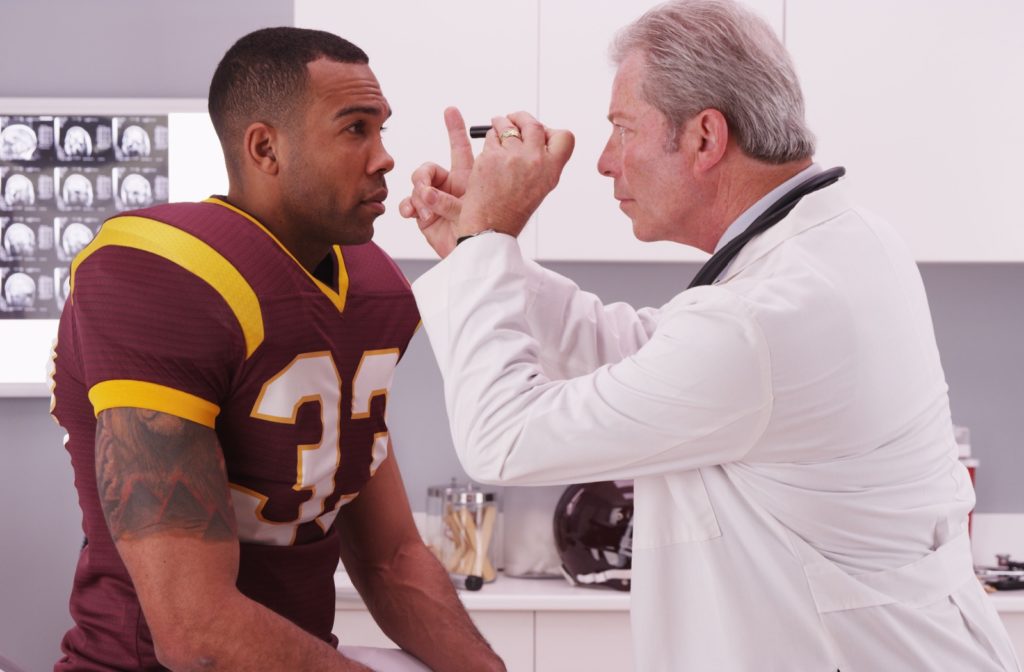Concussions are injuries that can happen to anyone. Many people assume concussions have easy-to-notice symptoms, but it depends on the severity of the injury. If you fall or hit your head, or have a whiplash injury, there are many concussion symptoms to look for, especially in the eyes.
Eye-related concussion symptoms include blurry vision, difficulty following objects, dilated pupils, light sensitivity, and more. Visit your doctor if you experience these symptoms after hitting your head—don’t assume everything is fine.
What Is a Concussion?
A concussion is a type of traumatic brain injury that can occur after a blow to the head and/or a whiplash injury. A concussion is not just a bump on the head but rather a disruption in the normal functioning of the brain.
Some common concussion-related symptoms include:
- Persistent headaches
- Nausea
- Drowsiness
- One pupil is larger than the other
- Seizures or convulsions
- Overstimulated in busy environments
- Slurred speech
- Loss of balance
- Sleep disturbance
- Excessive Fatigue
- Agitation or restlessness
Concussions can range in severity, so it’s essential to receive an assessment if you hit your head or suspect a brain injury.
The primary initial treatment for a concussion is rest. The brain can take several months to recover. As you recover, you will likely be advised to avoid physical activity, digital screens, or overstimulating environments.
You may experience vision problems during recovery, but your eye doctor can recommend ways to improve your symptoms, like vision therapy.
What Causes Concussions?
Concussions occur because of the forceful movement the brain goes through during an impact. There are 2 main types of movement almost always present in a concussion: your head moving straight ahead (linear acceleration) or your head twisting (rotational acceleration). These movements can cause the brain to jolt or twist inside the skull, damaging cells and disrupting normal functioning.
Common causes of concussions include:
- Falls
- Car accidents
- Contact sports
- Hard hits to the body
- Blows to the head
Concussion Eye Symptoms
While most people wouldn’t expect it, nearly 90% of concussions cause vision issues.
Dilated Pupils
An impact that causes a concussion can affect the brain stem, which controls pupil size. This disruption can cause the pupils to become abnormally large (dilated) and unresponsive to light for several hours or days. This is one of the causes for light sensitivity (photophobia) in patients with concussions.
Uneven Pupil Sizes
A concussion disrupts the normal functioning of the brain, which includes areas that control pupil size. The nerves responsible for pupil constriction and dilation might be affected by the concussion, leading to unequal pupil size.
However, not everyone with a concussion will experience unequal pupils, and small, barely noticeable differences in pupil size can be normal.
Droopy Eyelids
When the brain is injured, it can affect the muscles that control the eyelids, causing them to droop. While eyelid drooping can occur due to other factors, such as fatigue or age, it’s always best to be cautious and get checked out by a healthcare professional if you experience this symptom after a hit to the head.
Eye Strain
A concussion can disrupt communication between the brain and the muscles that control your eyes, affecting their ability to track and focus. This disruption can cause eye fatigue, double vision, and difficulty reading.

Double Vision
Like eye strain, double vision can occur when you have a concussion. Double vision is when you see the same image twice, and it can make images appear side-by-side (horizontal) or stacked (vertical). This issue can happen after a concussion because the eyes struggle to work together as a team by pointing in the same place.
This condition is called convergence insufficiency and can lead to double or blurred vision.
Light Sensitivity
A concussion can change how your brain interprets light, leading to light sensitivity. This common symptom can make looking at bright lights or screens challenging and cause headaches and eye strain.
Even being exposed to normal levels of light can cause headaches, dizziness, and nausea in those with a concussion.
Visual Focusing (Accommodation)
A concussion can sometimes cause trouble focusing on close objects. For example, when reading a book the eyes may have difficulty focusing properly to bring the images from both eyes into clear focus.
Difficulty Tracking Objects
One of the most common concussion symptoms is difficulty tracking objects with your eyes. This issue can manifest in many ways, such as difficulty focusing on multiple objects, blurry vision, or visual fatigue.
Abnormal Eye Movements
One of the less obvious but still important symptoms of a concussion is abnormal eye movements, such as the inability to follow a moving object smoothly or having quick, jerky eye movements.
The brain controls eye movements, so when it’s injured, those movements can be affected. They can affect reading, driving, and scanning items in a store.
When Should You Visit a Doctor?
Concussions can happen to anyone, even if you’re wearing proper protection. It can be difficult to tell if someone has a concussion after they hit their head, so seek immediate medical attention after a blow or injury to the head or face, especially if you experience any symptoms.
While eye-related concussion symptoms should resolve with time, contact your eye doctor if they persist. Our team at Beyond 20/20 Optometry is here to help support your road to recovery.




